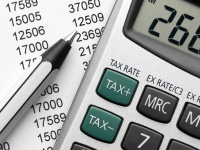Cash Basis: Tax Nightmare or Freelancer’s Dream?
February 26, 2013 1 Comment
 Whether you spend the year preparing payments or remain in denial until the night before, the chances are that paying your tax each year takes its toll on your bank account – not to mention the stress of finding, filling in and sending off the right information in time. But what if someone could offer you an easier way?
Whether you spend the year preparing payments or remain in denial until the night before, the chances are that paying your tax each year takes its toll on your bank account – not to mention the stress of finding, filling in and sending off the right information in time. But what if someone could offer you an easier way?
A recent YouGov poll found 21 percent of micro-business owners were made anxious each year by the tax process and 5 percent even admitted to being terrified. The good news is that just over a third of micro-business owners said they felt confident going through the process but even so, the majority of respondents also explained they end up paying more than just their tax when accountancy and advice fees are added.
So, when the Chancellor announced in his 2012 budget that the Office of Tax Simplification (OTS) would be working on a new, simpler system for Britain’s ‘one man bands’ to submit their tax, surely it was nothing but a good thing?
The OTS went into a series of very democratic negotiations with lawyers and businesses and came up with: the Cash Basis System.
This new tax system essentially means no more full GAAP accounts with lengthy calculations for the smallest UK businesses as the business would be taxed purely on a cash basis. This would eliminate the need for stock records and understanding capital allowances and, consequently, hopefully help businesses save money on fewer accountancy fees.
The aim is to make life simpler and cheaper for all of the UK’s smallest businesses so Cash Basis will be available to businesses with a turnover up to £70,000. Estimates suggest that, in total, this could benefit around three million businesses in the UK.
However, recently the tone towards this news has changed, ever since everyone’s favourite government department (HM Revenue and Customs – in case you weren’t sure) got their hands on the OTS’s plans and created all sorts of limitations. For example, simplified mileage rates would be mandatory and these are calculated only for cars or motorcycles (not vans), the majority of interest on cash borrowing would not be allowed as an expense (although you can claim up to £500 of interest as an expense), and sideways relief for negative results would not be allowed at all.
These editions have angered many including original exponents of the tax system, the Association of Taxation Technicians (ATT). Yvette Nunn, ATT President, said that since HMRC’s changes “these proposals seem to be the worst of both worlds”. She explained that they now propose “a degree of complexity (to prevent tax leakage) that will be daunting to the really small business, and restrictions (in the interest of simplicity) that will make the system unattractive to the next level of business.”
Nunn even went on to say that she was struggling to believe that any “reasonably competent” accountant would ever recommend the Cash Basis system if it might result in the denial of loss relief for their client.
This ties in with the sentiment the Chartered Institute of Taxation:
“We suggest a rethink to prevent the new regime being seen as anti-business. We note that HMRC have already indicated a willingness to consult further and hope the government will challenge HMRC to grasp this opportunity to make life truly simpler for smaller businesses and make real and significant changes to the proposals. Missing this opportunity for genuine simplification would be a real loss for the UK’s small businesses.”
The expected costs and savings of the Cash Basis system are expected to be detailed in this year’s Budget speech and the system itself is expected to be available from April. People4business is keen to hear your opinion; will you be one of the Cash Basis pioneers or are you much happier carrying on as you were? Email us at press@people4.com.
